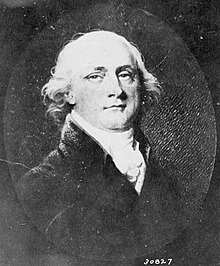
Back جون فرنسيس ميرسير Arabic جون فرنسيس ميرسير ARZ جان فرانسیس مرسر AZB John Francis Mercer German جان فرانسیس مرسر Persian ジョン・フランシス・マーサー Japanese Ioannes Franciscus Mercer Latin John Francis Mercer Polish Мерсер, Джон Фрэнсис Russian John Francis Mercer Swedish
John Francis Mercer | |
|---|---|
 Portrait by Robert Field, 1803 | |
| 10th Governor of Maryland | |
| In office November 10, 1801 – November 13, 1803 | |
| Preceded by | Benjamin Ogle |
| Succeeded by | Robert Bowie |
| Member of the U.S. House of Representatives from Maryland's 2nd district | |
| In office March 4, 1793 – April 13, 1794 | |
| Preceded by | William Hindman |
| Succeeded by | Gabriel Duvall |
| Member of the U.S. House of Representatives from Maryland's 3rd district | |
| In office February 5, 1792 – March 3, 1793 | |
| Preceded by | William Pinkney |
| Succeeded by | Uriah Forrest |
| Member of the Lower House of the Maryland General Assembly for Anne Arundel County | |
| In office 1800-1801, 1803-1805 | |
| In office 1788-1792 | |
| Member of the Virginia House of Delegates for Stafford County | |
| In office October 1785 – January, 1786 Serving with William Garrard | |
| Preceded by | William Brent |
| Succeeded by | Andrew Buchannan |
| Member of the Continental Congress for Virginia | |
| In office 1782–1785 | |
| Member of the Virginia House of Delegates for Stafford County | |
| In office May 1782 – December 1782 Serving with Charles Carter | |
| Preceded by | Thomas Mountjoy |
| Succeeded by | Thomson Mason |
| Personal details | |
| Born | May 17, 1759 Stafford County, Colony of Virginia, British America |
| Died | August 30, 1821 (aged 62) Philadelphia, Pennsylvania, U.S. |
| Resting place | Cedar Park Estate, Galesville, Maryland |
| Nationality | American |
| Political party | Anti-Federalist (1782), Federalist (1801) |
| Spouse | Sophia Sprigg |
| Relations | John Mercer, James Mercer, George Mercer |
| Children | 4, including Margaret Mercer, John Mercer Jr. |
| Residence | Anne Arundel County, Maryland |
| Alma mater | College of William and Mary |
| Occupation | Lawyer, politician |
| Military service | |
| Allegiance | |
| Rank | |
| Unit | 3rd Virginia Regiment Virginia militia |
| Battles/wars | American Revolutionary War Battle of Brandywine (WIA) Battle of Guilford |
John Francis Mercer (May 17, 1759 – August 30, 1821) was a Founding Father of the United States, politician, lawyer, planter, and slave owner from Virginia and Maryland. An officer during the Revolutionary War, Mercer initially served in the Virginia House of Delegates and then the Maryland State Assembly. As a member of the assembly, he was appointed a delegate from Maryland to the Philadelphia Convention of 1787, where he was a framer of the U.S. Constitution though he left the convention before signing. Mercer was later elected to the U.S. House of Representatives from two different districts in Maryland. In 1801—1803, he served as Maryland's 10th governor.[1][2]
- ^ Papenfuse, Edward C.; Day, Alan F.; Jordan, David W.; Stiverson, Gregory A. (1979). A Biographical Dictionary of the Maryland Legislature 1635-1789. Vol. 2. Baltimore: The Johns Hopkins University Press. p. 594. ISBN 0-8018-1995-4.
- ^
- United States Congress. "John Francis Mercer (id: M000645)". Biographical Directory of the United States Congress.
© MMXXIII Rich X Search. We shall prevail. All rights reserved. Rich X Search